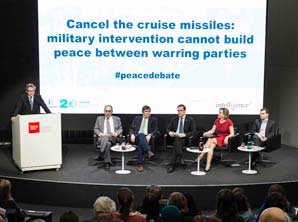Interpeace's 20th anniversary peace debate kicks off first-ever Geneva Peace Week

To celebrate two decades of peacebuilding around the world, Interpeace hosted an evening of debate with Intelligence Squared, the world's premier debating forum. This event kicked off Geneva's first ever Peace Week.
Scott Weber, Director-General of Interpeace, moderated a discussion between four eminent speakers on the timely motion: Cancel the cruise missiles: military intervention cannot build peace between warring parties. He explained that "This debate is important and timely because military interventions after September 11th are polarizing the world and provoking a wider discussion about what it takes to build more peaceful societies".
Speaking in favour of the motion, Rubén Zamora, Ambassador of El Salvador to the United Nations in New York, defended the idea that "Financially, military intervention is the most costly solution to crises." Dr. Zamora added that "Complex peace solutions are beyond the military." Also speaking for the motion, Philip Wilkinson, retired Colonel in the British Army, highlighted the fact that "9/11 was a game changer that sparked a decade of military intervention which has not been successful."
In contrast, Colleen Graffy, former United States Deputy Assistant Secretary of State for Public Diplomacy for Europe and Eurasia, and Oliver Kamm, leader writer and columnist for The Times, spoke against the motion. The crux of Prof. Graffy's argument was that "There will be times when soft power without hard power will be no power at all", and hence that "The military provides suitable environments for NGOs and organizations to participate in peacebuilding processes." In addition, Mr. Kamm strongly maintained that "Only the shame and ignominy of the idea of defeat can bring these [recalcitrant] regimes to the table."
The audience had the opportunity to express itself on the motion by voting before and after the speakers' interventions. Before the debate, the results showed that 60% were in favour of the motion, 20% were against and 20% were undecided. After listening to the arguments, the audience had changed its position: 61% of them voted for the motion, 29% against, and 10% remained undecided.
Interpeace had chosen to stage such a debate for this very reason: to provoke a productive discussion between advocates of opposing opinions about why we need alternatives to military intervention.
"The nature of conflicts is still evolving and we have to find new solutions and constantly rethink how we can respond to challenges, that's why tonight's debate is so important," said Matthias Stiefel, founder of Interpeace.
Interpeace is an independent, international peacebuilding organization. It was initially established by the United Nations to develop innovative solutions to build peace. Today it supports locally-led peacebuilding initiatives in over 21 countries across Central America, Africa, Europe, the Middle East and Asia.
Intelligence Squared was founded in London in 2002 and now operates in New York, Sydney, Hong Kong and Israel. Its debates — many of which are televised on BBC World News to a global audience of 80 million — have featured a prestigious range of speakers including President Jimmy Carter, Archbishop Desmond Tutu, Patti Smith and Richard Dawkins.
